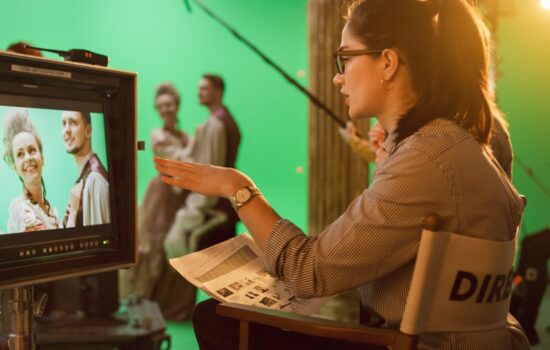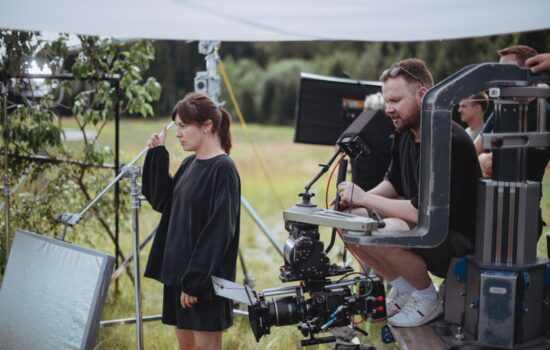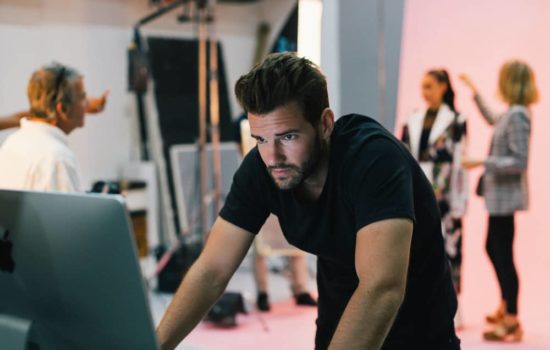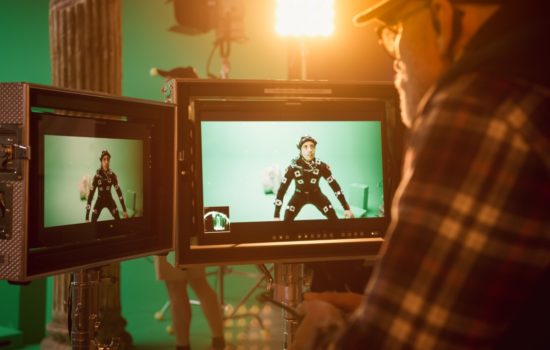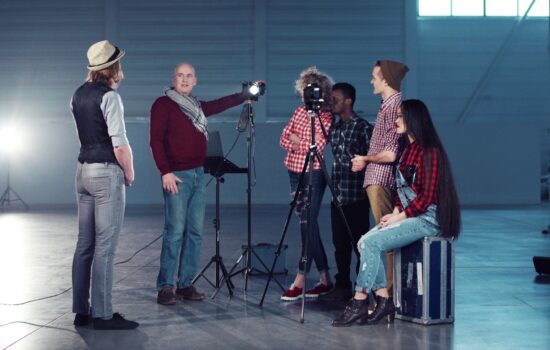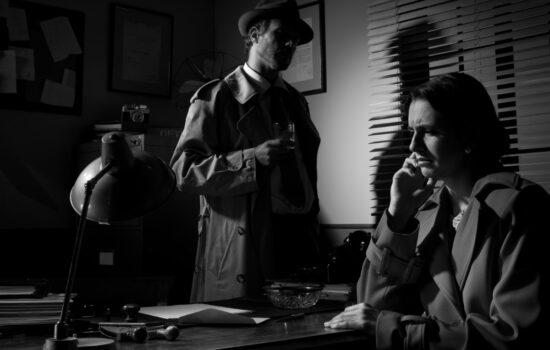Film Electrician

How To Become a Film Electrician
People also ask
Career Description
“There are two types of Electric in the filmmaking process. One is a Rigging Electric and the other is an On-Set Electric. They both work in the principal photography phase of production,” says Ryan Perdew, a member of IATSE Local 479.
The Rigging team is a second unit that works ahead of the On-Set Electric team. They put down all the temporary power networks by laying the cable for all departments. When the first unit arrives things can move faster. The Rigging Electrics are also responsible for setting tons of lights and hanging thousands of feet of cable in a very neat and orderly manner, usually in the ceiling. It must all be accomplished in a short period of time.
The end goal is that when the On-Set Electric team or 1st Unit arrives they can check the rig that has been set up, make sure all departments have power — including Craft Services as well as the Producer’s monitors — and then do lighting tweaks on set for filming.
When principal photography begins, the Electrics set up each light for each shot from a staging area of gear to the specifications of what the Gaffer, Boom Operator and Director of Photography need. Being a Film Electrician is a labor-intensive job that involves following orders down to the detail.
What does a Film Electrician do?
A Film Electrician works on a film set and is generally part of a team that coordinates the setup of the lights needed to shoot a movie.
Salary
The average annual salary for Electrics is approximately $51,000. The salary range for Electrics runs from $35,000 to $73,000.
The Electrical Workers Union sets a pay scale for its members, whereas non-union types who are just looking to get a foot-in-the-door through indie projects will usually earn less. Electrics generally earn around $500 to $2000 per week.
Hey, what do you think about trying our new Film Career HelperFilm Career Helper really quick? It’s totally free and could help get your career moving fast! Give it a try. It’s totally free and you have nothing to lose.
Career Outlook
Both the Rigging Electric and On-Set Electric are freelance positions; however, one has a more defined schedule while the other varies. It is up to the individual to determine what type of jobs they will accept and to balance how much they work with their personal life.
Perdew describes being a Rigging Electric versus an On-Set Electric, saying, “rigging is usually 7 am to 7 pm, Monday through Friday. Being on set is a carnival, really a rotating ‘screw you.’ Usually, features begin their schedule on Monday, then as days go longer, people feel pressure to get things done. ‘We need to get that scene,’ etcetera. Then call times get pushed back because the previous day ran over and there needs to be a twelve-hour break before filming resumes.
“That means the night stuff goes later in the week. Sometimes people will then work Friday overnight all the way into Saturday morning. That may not sound too bad, but imagine doing it for seventy-plus shoot days…it gets brutal.” While there is going to be more opportunity for overtime working as a 1st Unit Electric, the schedule is more intense. For the rigging crew, there are no overnights and no sliding schedule.
There are a few things to remember when working as a freelance Electric, as well. Many people go back and forth between being a Rigging Electric and On-Set Electric because the departments talk. Somedays one department will need more crew so they’ll pull from the other side. Additionally, a lot of big jobs steal crew from other ones, so Electrics work on various sets.
It’s always smart for someone to know where they’re shooting before taking a job. Is it in a bad neighborhood? Does the film take place on a lake? Being a responsible Electrician includes knowing and accepting where one will be working.
For Electricians, at the top of the hierarchy for a film set is the Cinematographer, followed by a Rigging Gaffer and On-Set Gaffer. Each of the Gaffers has their own lighting teams, including Best Boys and Electricians. Essentially, the Gaffer works with the Cinematographer to achieve the lighting for a film, while their Best Boys manage the crew of Electricians to pull it off.
The Electric Department works hand-in-hand with the Grip Department because the Grips shape and cut the light that the Electricians set up. It should all work like a well-oiled machine.
What is an Electrician on a film set called?
The person who leads the team of Film Electricians is called the Gaffer. Everyone who works under this individual is generally referred to as a Film Electrician.
Career Path
In Atlanta, Georgia, the film industry is booming in a different way than in Los Angeles. Perdew says, “All of the big movies get all of the green, new people. It depends on where in the country, of course, but right now, it’s so busy in Atlanta, people can immediately start as a Rigging Electrician. There isn’t a lot of creative thinking involved, mostly just learning on set.”
He goes on to say, “In Philadelphia, my experience was doing PA work on commercials then talking to Electricians and they taught me.” So, where someone begins their career will determine at what job level they can start. However, first, they’ll need to learn how to rig before moving onto set. A 1st Unit Electric is tasked with the time crunch of shooting and stress that comes from working on set.
As someone advances through the Electric department, they will move up to becoming a Best Boy, then Gaffer. There is a rigging side as well as the production side for both jobs. It’s important for aspiring Electrics to build their network for first and second unit, creating job security as well as advancement opportunities. This is a freelance career that works off referrals.
Promotions happen through someone else witnessing a person’s hard work and bringing them onto a new project with them. To advance as an Electric, get to know as many Best Boys and Gaffers as possible while providing solid work.
Perdew advises, “Landing the first job in Electric involves going up to people in that department and asking them for work. There are no applications or applying. It’s usually just going out there and being vocal. I would equate it to playing pickup basketball. It’s a game of personal connections and letting people know you’re available, making sure that the captains who are picking teams know you’re ready to play.”
Sometimes it’s going to a local bar where the Best Boys go out to grab a drink and chatting them up. Since so much of the job is following orders and working with people, developing a personal connection can go a long way to getting hired.
- Get on a set as a PA to learn etiquette and make connections.
- Work in a grip and electric rental house.
- Have the tools required to do the job (a meter to test voltage and amperage, a mullet meter, basic hand tools, screwdrivers, etc.). People get shamed for not having the right personal tools on set.
- Make a habit of being on time to places.
- Get all the Best Boys’ numbers from the local unions and call them up.
- Go to the right bars to meet people and make connections.
How do you become a Film Set Electrician?
Film Set Electricians very commonly start off in apprenticeships or Production Assistant positions for a film. As they gain experience and expertise in the field, they can rise through the ranks, join the union, and become vital members of the electrical team. Because Film Set Electricians must have comprehensive knowledge of both the science and safety of electricity, many of them will go to a technical school to learn these skillsets.
Experience & Skills
The experience and special skills required to be an Electric are technical certifications and interpersonal skills. Perdew says, “An Electric needs Ariel Lift Certifications as well as the ability to communicate properly. Just listen to instructions and follow them with a lot of awareness; it’s that simple. If you do something wrong, fires could get started, people electrocuted, or expensive equipment broken.”
The Electric Department must do a lot of physical labor, as well. They’re responsible for moving, setting up and breaking down lights. Essentially, much of the job is being a cog in a machine. A lot of prior experience isn’t required, apart from necessary certifications — just the ability to follow orders down to the detail so nobody gets hurt and things run smoothly.
Working as a Film Electrician is in many ways a social job. Everyone works in teams so the people who get rehired are those who get along well with others.
Perdew says, “The best personalities are those receptive to criticism. A lot of people are egotistical, which hurts them. It’s good to have thick skin, especially in new waters, because people will try to cut you down. Sometimes that happens and you must be cool with it and turn the other cheek. It’s really like a social club. If people like hanging out with you, then they’ll hire you. If not, you’re only going to get work when people are desperate to fill a position.”
Success as an Electrician comes down to personality. People with a bad attitude who just want to show up and do the job won’t last long. Bosses want somebody who is trustworthy. They can’t always be there to supervise every single aspect, like wrapping out a location, so they need to be able to trust a job will get done without them cracking the whip.
Education & Training
Training for a Film Electrician is simple. They need to know the names of all the gear they will be using and how to use it. Set etiquette is important.
Perdew recommends checking out “The Set Lighting Handbook by Harry Box. It’s the Bible. All of the information is there, from tech stuff to how to work on set.” A lot of the job is listening to orders, doing what someone else says, and getting gear. Some people get antsy and try to do everything too fast, missing key pieces. Listening and working on set are the best ways to learn all the different names of lights and how to use them.
Sometimes learning on the job can be intimidating. A lot of people will instead work at a rental house for lighting and grip gear. It’s a good way to learn the equipment without the pressure of being on set. Also, when a Best Boy Electric goes to rent gear, they will sometimes hire the people working at the shop.
If working in a shop doesn’t sound interesting, a lot of people become Production Assistants on set and talk to people in the Electric Department. Electricians are willing to teach their job to newcomers if a person isn’t distracting or annoying. So, there are a few different ways of learning how to become an Electric, from reading, working in a rental house, to working as a PA on set.
It should be noted that due to the hands-on nature of the gear, this isn’t a job that requires film school because that won’t give the requisite practical experience of working with gear used in large productions.
Additional Resources
Most learning comes from working on set as an Electrician, but there are a few good online resources and organizations to check out for personal enrichment as well. “There are plenty of instructions on how to use specific equipment on YouTube and then there’s also a website called No Film School that has a lot of instructional videos,” Perdew states.
He also says that the Electrical Workers Union offers classes, although it’s not really a highly utilized offering. Other than that, the rental houses almost act like a teaching organization. People go to work in them and learn what everything is. Whether someone is going online or working at a rental house, the most important thing to do is learn the equipment.
FAQ
What is the single biggest suggestion you would give to someone wanting to get into this career?
“People always undervalue the power of being outgoing and teachable. If someone puts themselves in the right place and is willing to say hello then it will infinitely increase their chances of landing a job. If people are looking for work, they will get hired first and build their network further.
“Those who keep to themselves, have weird attitudes, complain a lot or criticize others just won’t get hired as often. This is a game where it isn’t just the work that matters but how it’s done in conjunction with others.”
What’s the #1 mistake people make when trying to get into this career?
“One of the biggest issues is overconfidence. People show up thinking they have a grasp on everything, puffing up their chest. That ego rubs people the wrong way. Nobody likes a know-it-all.
“A lot of times a boss will say to redo work a specific way. Even though it may not be as good in the Electric’s way of thinking it’s important to just put in the extra effort and not give them flack. At the end of the day, the boss is the client because they will be rehiring the Electricians on the next job. Trying to show off won’t help anything but instead will put an Electric out of work.”
What is the question people should ask about this career but rarely do?
“How can people get ahead as an Electric?
“The best way to improve one’s skills and get ahead in the field as an Electric is to discover why something is being done in a specific way. A lot of people just do a task and move on instead of figuring out the method behind it. They act like mules and just do it a thousand times over, never really understanding the reasoning.
“However, if someone takes initiative and figures out ‘why’ in a genuine, learning way, their boss will be inclined to give them more responsibility in the future. They will be trusted to take care of tasks without as much micromanagement, thus taking more workload off their boss. This is a great way to get rehired and gain more experience.”
What is one thing I should have asked which I didn’t?
“How does someone join the Electricians Union?
“Union requirements vary from location to location. In Atlanta, it is just a dollar amount to join, while in Los Angeles it requires references and a certain number of hours working on a union set. That can be a catch twenty-two. The only way to break in is by being on a project that flips from being non-union to union or to get a direct-hire from a union Gaffer or Best Boy.
“Most times, direct hires come from someone working with a union crew member in a place like Atlanta and then hiring them to work on a Los Angeles job. It’s still a reference system based on personal contacts. The best thing to do is to contact the local union and find out what their requirements are and plan accordingly.
“Becoming union guarantees a certain dollar amount for labor worked that varies based on the budget of the film. They also guarantee wages are paid on time and overtime is respected.”
If you could describe in one word what makes you successful, what would it be?
“Likable. To get by in this business you’ve got to be likable, on time, and good at your job. Or at least two out of three of those things.”
Sources
References
- 1Multiple. "film Electrician Salaries". Glassdoor. published: Dec 14, 2019. retrieved on: Dec 14, 2019
